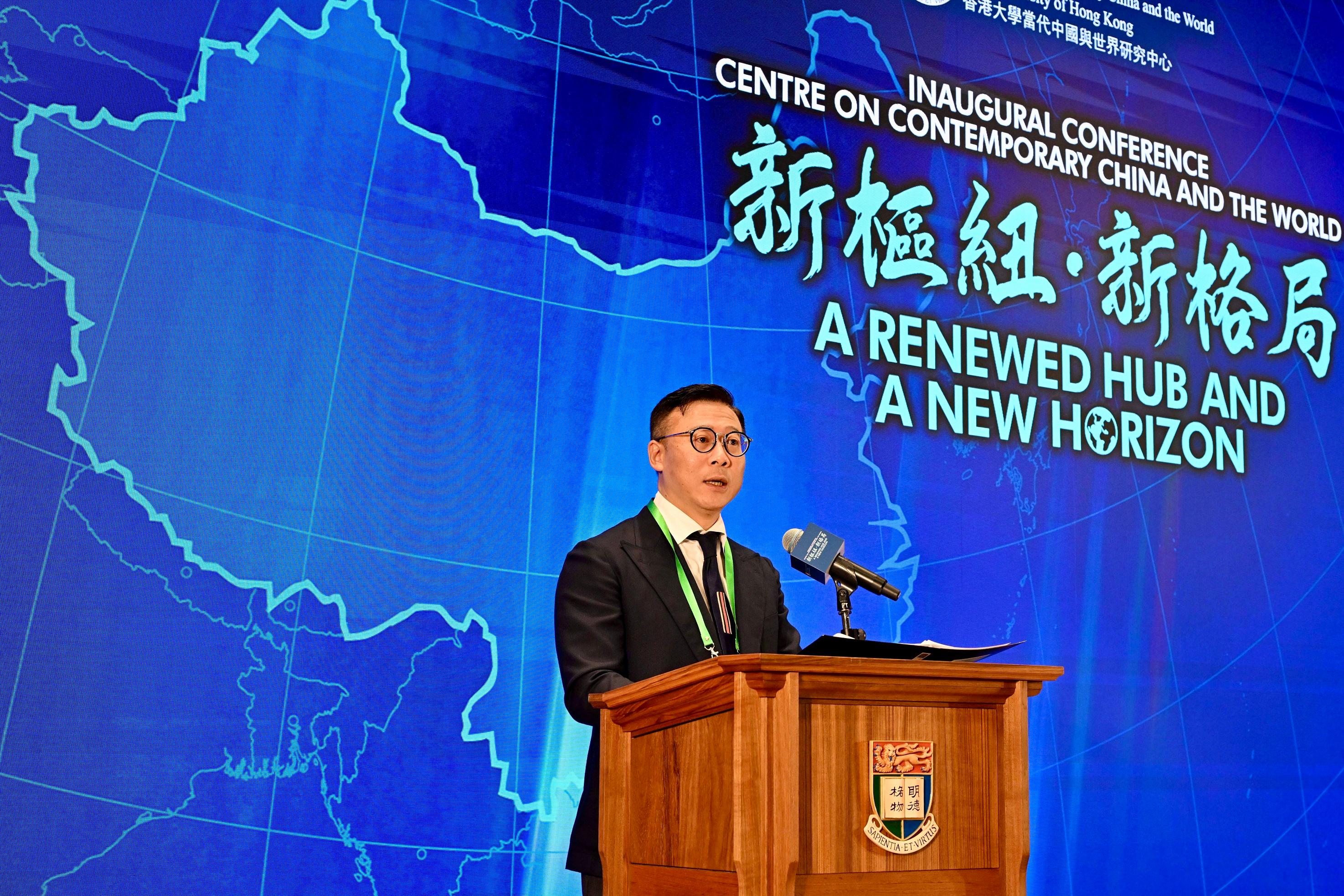Speech by DSJ at opening ceremony of Inaugural Conference of Centre on Contemporary China and the World of HKU (English only) (with photo)
Following are the opening remarks by the Deputy Secretary for Justice, Mr Cheung Kwok-kwan, at the opening ceremony of the Inaugural Conference of the Centre on Contemporary China and the World (CCCW) of the University of Hong Kong today (December 15):
President Zhang (President and Vice-chancellor of the University of Hong Kong, Professor Zhang Xiang), Director Li (Director of the CCCW, Professor Li Cheng), distinguished guests, ladies and gentlemen,
Good morning. It is with great pleasure that I join you all in this prestigious inaugural conference, celebrating the establishment of this remarkable research centre in the University of Hong Kong (HKU) and sharing on the theme of "A Renewed Hub and a New Horizon".
It is very true that the question of governance has drawn unprecedented attention on both domestic and global perspectives. Meanwhile, the Sino-US (United States) relationship, the most consequential bilateral relationship in the world, has become uncertain over the last few years. It is therefore, more than ever, that a leading global hub focused on studying the governance of China and the world is urgently needed.
As regards bilateral relations, there is no doubt that China and the United States are the two largest economies in the world, and represent one of the most important bilateral relations. The late Dr Henry Kissinger repeatedly stressed that the US-China relationship is essential to peace, development and prosperity of the two countries and the wider world.
Delightedly, the recent historic summit between President Xi and President Biden in San Francisco fostered a forward-looking San Francisco vision, which is of milestone significance. As President Xi told President Biden, "Planet Earth is big enough for the two countries to succeed", adding that the right thing to do is to choose mutual benefit over a zero-sum game. In response, President Biden also emphasised the need to avoid miscommunication and that competition does not veer into conflict.
Looking ahead, China and the United States can help each other succeed and prosper together, and the key of handling the Sino-US relations is to follow the fundamental principles of mutual respect, peaceful co-existence and win-win co-operation, said President Xi.
There are certainly other very important international relations such as Europe and the Asia-Pacific region. President Xi remarked that China and Europe are two major forces, markets, and civilisations on the world stage. They are the "two major forces advancing multi-polarity", "two major markets in support of globalization", and "two major civilizations championing diversity". China-EU (European Union) ties are also a foreign policy priority of China.
The EU leaders also reiterated that the EU totally disapproves of decoupling and severing supply chains from China, and hopes to strengthen exchanges and dialogue with China, and carry out more mutually beneficial cooperation.
As regards the Asia-Pacific region, in the recent meeting with the Australian Prime Minister in Beijing, President Xi remarked that China and Australia are both Asia-Pacific countries and important members of the G20, with no historical grievances or fundamental conflicts of interest, but every reason to be partners of mutual trust and mutual achievement. Both countries have embarked on the right path of improving relations.
The Australian Prime Minister responded that the two countries share extensive common interests, and dialogue and co-operation is the right choice to achieve win-win results.
Indeed, the world is undergoing momentous transformations unseen in a century and the global landscape is going through major shifts. Whatever the positions, the stakeholders have come to a crossroads, which requires wisdom as to where to go from here.
At this critical juncture, Hong Kong can make its contribution and has subtle but genuine leverage to strengthen connections.
We are a cosmopolitan city and share many values, from the rule of law to the free flow of capital, goods and talent, freely convertible currencies, and an open and free market.
We are bestowed with the advantages of the common law system in Hong Kong; the judiciary in Hong Kong exercising its power independently; and the enjoyment of rights and freedoms in Hong Kong based on international standards and guaranteed by the Basic Law, including the freedom to engage in academic research.
We are a full and separate member of international organisations such as WTO (World Trade Organization) and APEC (Asia-Pacific Economic Cooperation).We are part of an extensive network of multi-lateral and bilateral agreements with other jurisdictions and international organisations.
Above all, the wide and international network enables us to keep doing what we are good at, namely, bridging between the Mainland of China and the rest of the world, and making Hong Kong the optimal location as a global hub of studying the governance of China and the world.
Hong Kong can serve as a key lever in the next phase of Sino-US relations, and more broadly, East-West and South-North interactions. And the CCCW, which builds on a foundation at HKU, is strategically positioned to serve as an institutional home for interdisciplinary and international collaboration.
Let us embrace this opportunity with a shared vision of Hong Kong playing a pivotal role in revitalising and strengthening the bonds that span across the Pacific and beyond, enabling us to overcome challenges and seize new opportunities. Thank you very much.
